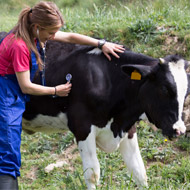MEPs approve Animal Health Law

The new law will give authorities and producers more time to focus on prevention and control of transmissible animal diseases.
New legislation to prevent and halt outbreaks of animal diseases, informally agreed by MEPs in 2015, was signed into law on Tuesday (9 March).
The Animal Health Law streamlines the huge number of legal acts relating to animal health into a single law.
Ministers agree that simpler and clearer rules will free up time, enabling authorities and those having to follow the rules to focus on preventing and eradicating disease.
"The adoption of the Animal Health Law is a great victory,” said rapporteur Jasenko Selimovic.
“This law makes three things possible. First, it links animal health and welfare and connects it to human health. This direct link, together with emphasis on responsible use of antibiotics, will help us fight growing antimicrobial resistance.
“Second, it enables the authorities and producers to focus more closely on prevention and control of transmissible animal diseases. And third, it merges around 40 legal acts into one basic act”.
Under the new law, all vets, farmers, traders and pet owners will be obliged to apply the principles of good animal husbandry. They will also be required to use veterinary medicines with caution.
Vets will be duty-bound to raise awareness of the interaction between animal health and welfare and human health, as well as antimicrobial resistance.
For its part, the EU Commission has pledged to monitor the actual use of animal antibiotics in member states and regularly publish compatible data.
The new law will give the EU Commission the power to take urgent measures to tackle emerging diseases that may have a “highly significant impact” on public health and agricultural production.
Furthermore, to help prevent strays or illegally traded pets transmitting animal disease, MEPs inserted rules that would require all professional pet keepers and sellers to be registered.
The legislation will be published in the Official Journal of the European Union. It will enter into force 20 days later and will be applicable five years thereafter.
To view the adopted text visit: http://data.consilium.europa.eu/doc/document/ST-11779-2015-INIT/en/pdf



 The latest
The latest